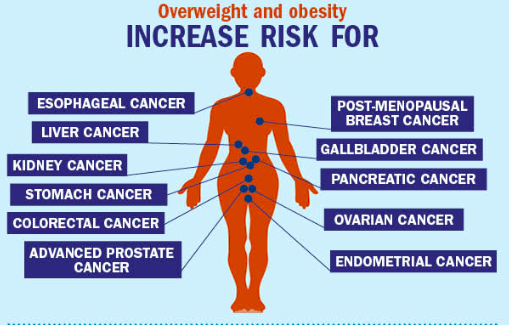A new government report finds that overweight- and obesity-related cancers account for approximately 40 percent of all cancers in the US and the incidence of almost all obesity-related cancers is rising. The report, by the Centers for Disease Control and Prevention (CDC), suggest a troubling trend that mirrors the increasing US obesity rates in recent decades.
AICR research shows that overweight and obesity is a cause of many common cancers.
“We know that obesity has increased, now we are seeing an increase in cancers that are associated with obesity – and a decline in those not associated with obesity,” said Nigel Brockton, PhD, AICR’s Director of Research.
Aside from not smoking, staying a healthy weight throughout life is the single most important lifestyle step to protect against cancer risk. AICR estimates that if all adults in the US were a healthy weight, it could prevent approximately 132,800 new cases of cancer each year.
The CDC report finds that about 630,000 people in the U.S. were diagnosed with a cancer associated with overweight and obesity in 2014, the most recent data available. Excluding colorectal cancer, incidence rates increased significantly among those ages 20 to 74.
The rates of obesity-related cancers, not including colorectal cancer, increased by 7 percent between 2005 and 2014. The rates of non-obesity related cancers declined during that time.
Screening for colorectal cancer may have led to fewer incidence. Colorectal cancer rates declined in all age groups except in those ages 20 to 49.
Overall, the rate of new cancer cases has decreased since the 1990s, but increases in overweight- and obesity-related cancers are likely slowing this progress.
The CDC report pulled incidence data for the 13 cancers that International Agency for Research on Cancer (IARC) identifies as overweight- and obesity-related. AICR research links overweight and obesity to 11 cancers, including post-menopausal breast, colorectal and endometrial.
Body fat is a metabolically active organ and how it may promote cancer is an active area of research. Fat cells could lead to high levels of hormones that fuel certain cancers and produce substances that lead to chronic inflammation.
Multilevel approaches to comprehensive cancer control that include evidence-based interventions to address healthy weight and other cancer risk factors might help lower the burden of cancer and other chronic diseases, the authors conclude.
Key findings in the CDC report include:
- 55 percent of all cancers diagnosed in women and 24 percent of those diagnosed in men are associated with overweight and obesity.
- Non-Hispanic blacks and non-Hispanic whites had higher incidence rates compared with other racial and ethnic groups. Black males and American Indian/Alaska Native males had higher incidence rates than white males.
- With the exception of colorectal cancers, the cancers associated with overweight and obesity increased 7 percent between 2005-2014. Colorectal cancer decreased 23 percent, due in large part to screening.
- Cancers not associated with overweight and obesity decreased 13 percent.
- Cancers associated with overweight and obesity, excluding colorectal cancer, increased among adults younger than age 75.






